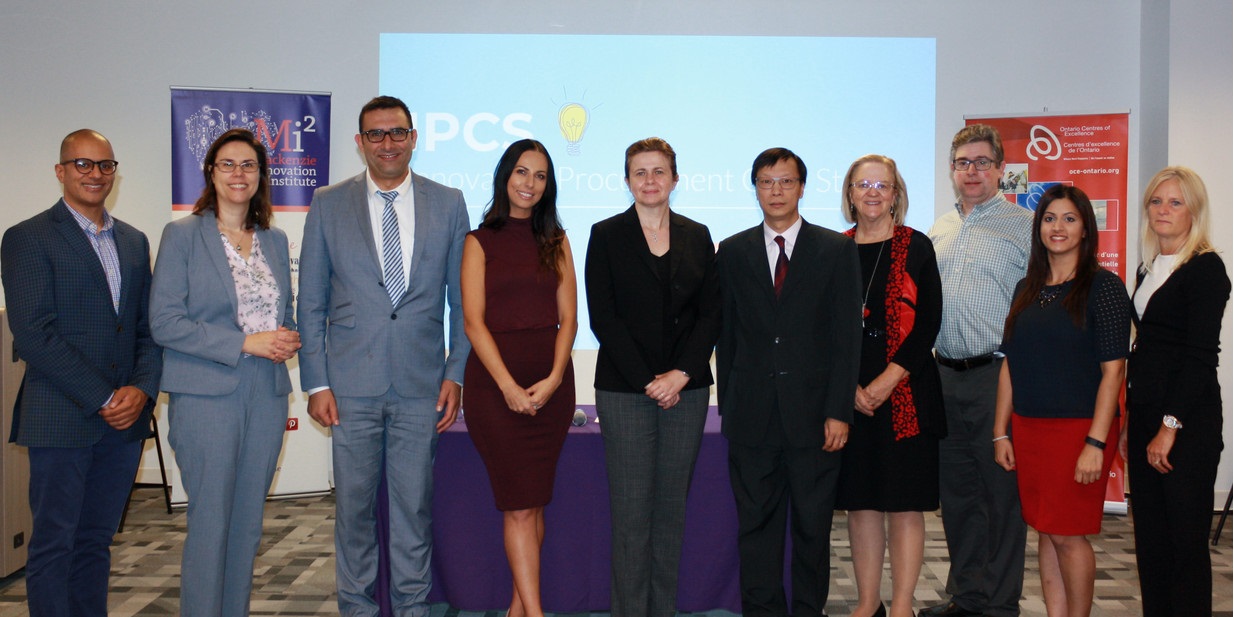IPCS Smart Privacy Auditing Seminar
On September 13, Dr. Waël Hassan, was a panelist at the Innovation Procurement Case Study Seminar on Smart Privacy Auditing, hosted by Mackenzie Innovation Institute (Mi2) and the Ontario Centres of Excellence (OCE). The seminar attracted leaders from the healthcare sector, the private information and technology industry, and privacy authorities. The seminar explored the concept of innovative procurement via the avenue of competitive dialogue, in addition to demonstrating the power and benefits of using artificial intelligence to automates the process of auditing all PHI accesses within a given hospital or health network.
What are the benefits of participating in an innovative procurement process, particularly competitive dialogue?
An innovative procurement partnership between Mi2, Mackenzie Health, Michael Garron Hospital, and Markham Stouffville Hospital was supported by the OCE’s REACH grant and sought to identify an innovative approach to auditing that could be applicable to the privacy challenges faced by numerous hospitals with different practices, policies, and information systems. Rather than focus on how the solution should operate, the partners collaboratively identified six outcome-based specifications the procured audit tool would be required to meet.
By identifying key priorities and specifying the outcomes a solution should achieve, Competitive Dialogue establishes a clear and mutual understanding of expectations. This can help the private sector narrow down solution options to a model best suited for the contracting authority’s unique context. The feedback loop provided by the iterative rounds (if used) enables vendors to clarify any confusion and customize proposals to the contracting authority’s unique needs, staff workflows, and policy contexts.
Competitive Dialogue is an opportunity for transparent communication that gives vendors the opportunity to learn more intimate details of what the contracting authority, in this case Mackenzie Health, needs from a solution. Because hospitals are not tech or security experts, they often struggle to accurately identify and define what solutions they need to solve a particular issue, and thus a traditional procurement process is rarely ideal since there is little to no room for clarification or feedback. This process is more flexible than the traditional procurement process and thereby allows for more creativity and innovative thinking processes during the initial proposal development. Encouraging creativity and creating a competitive environment in which competing vendors may be sounding ideas off each other results in higher-quality proposals and final solutions.
Mackenzie Health Case Study
Mackenzie Health employs over 450 physicians and 2,600 other staff members, processes nearly 55,000 patient medical record accesses every day, and has just one privacy officer to monitor everything. Mackenzie Health’s privacy needs far outweigh its capacity, so they turned to the private sector for an innovative solution.
Section 37(1) of PHIPA outlines the possible uses of personal health information, and these guidelines are based on the purpose underlying the activities. Because the legal framework is centred on purpose, KI Design’s approach is to explain the purpose for accessing a given medical record. The core of this technology is more commonly known as an explanation-based auditing system (EBAS) designed and patented by Dr. Fabbri of Maize Analytics.
To detect unauthorized accesses, the technology has the capability of identifying an intelligible connection between the patient and the employee accessing the patient’s records. AI changes the fundamental question underlying auditing tools from “who is accessing patient records without an authorization?” to, “for what purpose are hospital staff accessing patient records?” Asking this question helps the technology break down staff workflows and identify common and unique purposes for accessing any given medical record, which are further categorized as either authorized access or unexplained access, which may then flagged as potentially unauthorized behaviour. The technology is able to filter out the authorized accesses, which are usually 98% to 99% of all accesses, so that the Privacy Officer can focus on the much smaller number of unexplained and flagged accesses.
Why is the private sector interested in health care?
Health care is an extremely complex system operated by the province and service providers. The province is a specialist in governance and regulation, the service providers are specialists in medicine – neither are experts in privacy or security. Companies such as KI Design are interested in filling the expertise gap within the healthcare sector by working closely in tandem with healthcare providers and the Information & Privacy Commissioner to adapt privacy and security solutions that are suitable for their working realities. There is irrevocable value added in having a privacy and security expert working directly with hospitals and other health service providers to assist in refining privacy best practices and implementing a privacy tool that will improve privacy and security outcomes without restricting the workflows of health practitioners.
